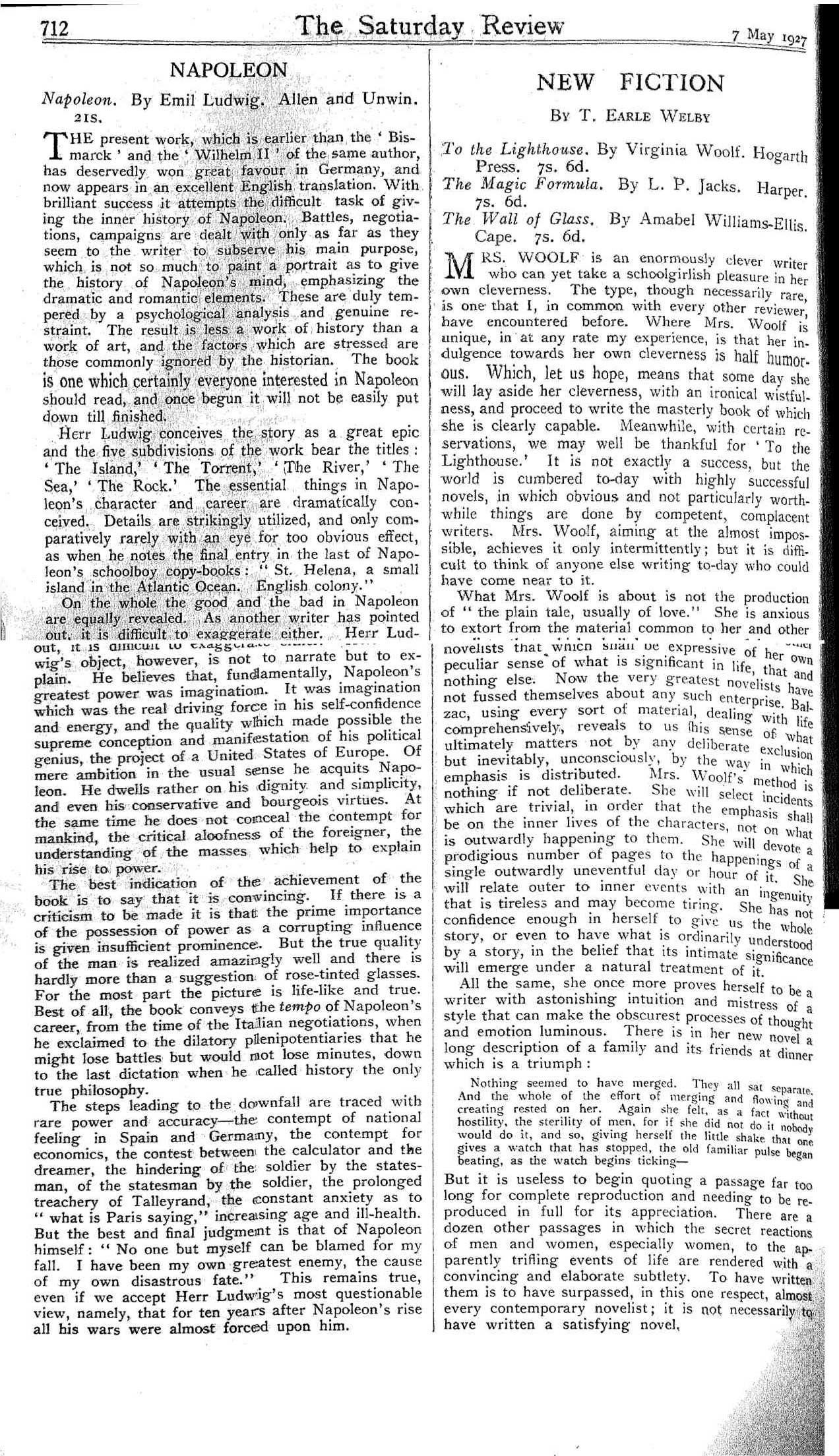
T. Earle Welby, ŌĆ£New Fiction.ŌĆØ The Saturday Review. May 7, 1927, p.712-713.
NEW FICTION
By T. Earle Welby
To the Lighthouse. By Virginia Woolf. Hogarth
Press. 7s. 6d.
The Magic Formula. By L. P. Jacks. Harper.
7s. 6d.
The Wall of Glass. By Amabel Williams-Ellis.
Cape. 7s. 6d.
MRS. WOOLF is an enormously clever writer
who can yet take a schoolgirlish pleasure in her
own cleverness. The type, though necessarily rare,
is one that I, in common with every other reviewer,
have encountered before. Where Mrs. Woolf is
unique, in at any rate my experience, is that her indulgence
towards her own cleverness is half humorous.
Which, let us hope, means that some day she
will lay aside her cleverness, with an ironical wistfulness,
and proceed to write the masterly book of which
she is clearly capable. Meanwhile, with certain reservations,
we may well be thankful for ŌĆśTo the
Lighthouse.ŌĆÖ It is not exactly a success, but the
world is cumbered to-day with highly successful
novels, in which obvious and not particularly worthwhile
things are done by competent, complacent
writers. Mrs. Woolf, aiming at the almost impossible,
achieves it only intermittently; but it is difficult
to think of anyone else writing to-day who could
have come near to it.
What Mrs. Woolf is about is not the production
of ŌĆ£the plain tale, usually of love.ŌĆØ She is anxious
to extort from the material common to her and other
novelists that which shall be expressive of her own
peculiar sense of what is significant in life, that and
nothing else. Now the very greatest novelists have
not fussed themselves about any such enterprise. Balzac,
using every sort of material, dealing with life
comprehensively, reveals to us his sense of what
ultimately matters not by any deliberate exclusion
but inevitably, unconsciously, by the way in which
emphasis is distributed. Mrs. WoolfŌĆÖs method is
nothing if not deliberate. She will select incidents
which are trivial, in order that the emphasis shall
be on the inner lives of the characters, not on what
is outwardly happening to them. She will devote a
prodigious number of pages to the happenings of a
single outwardly uneventful day or hour of it. She
will relate outer to inner events with an ingenuity
that is tireless and may become tiring. She has not
confidence enough in herself to give us the whole
story, or even to have what is ordinarily understood
by a story, in the belief that its intimate significance
will emerge under a natural treatment of it.
All the same, she once more proves herself to be a
writer with astonishing intuition and mistress of a
style that can make the obscurest processes of thought
and emotion luminous. There is in her new novel a
long description of a family and its friends at dinner
which is a triumph:
Nothing seemed to have merged. They all sat separate.
And the whole of the effort of merging and flowing and
creating rested on her. Again she felt, as a fact without
hostility, the sterility of men, for if she did not do it nobody
would do it, and so, giving herself the little shake that one
gives a watch that has stopped, the old familiar pulse began
beating, as the watch begins tickingŌĆö
But it is useless to begin quoting a passage far too
long for complete reproduction and needing to be reproduced
in full for its appreciation. There are a
dozen other passages in which the secret reactions
of men and women, especially women, to the apparently
trifling events of life are rendered with a
convincing and elaborate subtlety. To have written
them is to have surpassed, in this one respect, almost
every contemporary novelist; it is not necessarily to
have written a satisfying novel.






